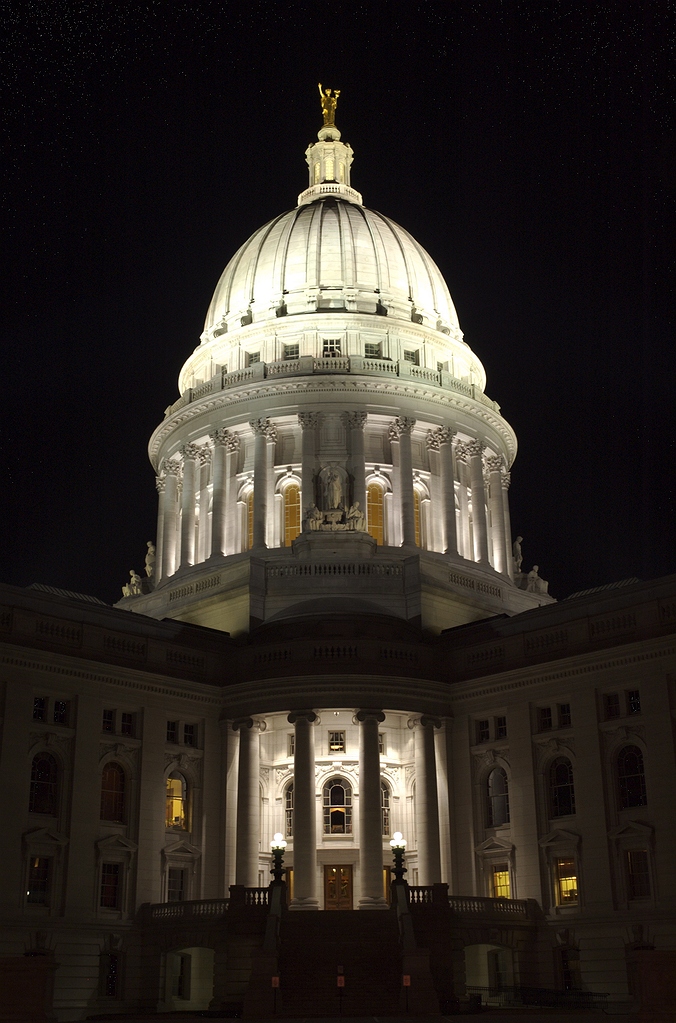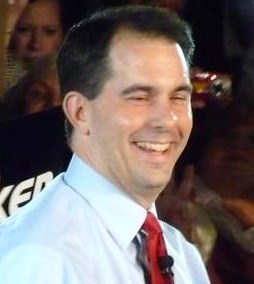Less Than You Bargained For…
 |
| WI State Capitol (wikipedia) |
Before we go on, we must take a moment to note that former governor Mitt Romney tried and failed to pull a similar stunt when the city plead for emergency financing in 2004. As Maureen Turner dutifully noted in her blog, his request was turned back by legislators who gave the city a loan in lieu of free cash.
The budget repair bill put forward by Wisconsin’s Republican governor, Scott Walker, would among other things, gut collective bargaining rights for state and local workers. While Walker has claimed—falsely—that rights are intact, in fact workers would be banned from bargaining on anything other than wages, be restricted from winning wages above an inflation index and would need to hold annual elections on whether to maintain the union. Meanwhile communities would be barred entirely from collecting union dues from workers for remittance to bargaining units’ locals. To add insult to injury, public safety workers would be mysteriously exempt. Several police and fire unions endorsed Walker. Mystery solved.
Unions, in particular public sector unions, are not perfect. Like any group or institution that can become a boogeyman for the easily misled, unions vices seem to stand out against their virtues. Public sector unions, like their private counterparts, can create a Byzantine system that makes reorganizations messy if not impossible. They may slow down changes in response to something that comes up unexpectedly.
 |
| (Wikipedia) |
The best example of this, coincidentally, are a group of government workers that would, in Gov. Walker’s utopia, not lose their bargaining rights. For several years the Boston Fire Department and the city locked horns over random drug testing, a common, uncompensated requirement of police and fire departments in Massachusetts. This started after fire in West Roxbury that killed two firefighters. One was legally drunk the other tested positive for cocaine according autopsy reports leaked to the media. The union would agree to the testing only if they got a pay bump. The city balked and contract negotiations stalled until it came before an arbitration panel. It ruled in favor of the union, but the contract still needed an appropriation from the City Council. The ruling infuriated residents and tide of discontent among the council threatened the approval. The union blinked and agreed to accept the testing sans pay increases.
Now if the above tale has made you mad, that is okay. However, it must be taken into perspective. Firefighters are unique because it is nearly impossible to assail them given their well-earned “hero” status. Most public sector unions could not get away with this, even teachers, who, especially in urban district are on a different kind of front line.
 |
| Protesting Dog in Hartford on 2/26 (WMassP&I) |
Usually public sector labor disputes come down to three things: pay, health and pension contributions and seniority. However one of the most important benefits public sector workers (and many union workers in the private sector) receive is a buffer against retaliation or unjust termination. This, too, would be unavailable to union workers if Walker’s bill passes. Generally, any government worker is entitled to a degree of due process under the US Constitution as employment is a property right. However, this protection is not as good as it sounds. Due process can be achieved with a kangaroo court hearing and, absent evidence of discrimination, a real court is unlikely to review it.
Imagine that you work in for the state of Wisconsin. Generally, you are seen as a hard worker and most coworkers and bosses value your work. However, you work with a person who does not like you, but who has friends in high places. Then, one day you learn you are getting transferred to another department at considerably less pay and more work. You have no recourse because your union cannot bargain on seniority or even against unjust retaliation. You appeal within the civil service system and discover that mistakes you made earlier in your career, from which you learned, were among the reasons justifying your demotion. Your appeal fails and your court case dismissed for failure to state a plausible claim for relief. You are lucky as some people completely lose their jobs on more spurious grounds. Imagine how much a lack of jobs security and protection will harm worker morale and thus undermine productivity and the value of every taxpayer dollar.
 |
| (Buffalo Beast) |
Only a few days ago, this story took a turn for the unfortuante. We all know that politics is the realm of inflated egos, but Gov. Walker, during a prank call with a blogger, revealed the extent of his. A Buffalo, N.Y. based blogger called Walker’s office and told his staff that he was David Koch, of the billionaire Koch Brothers, right wing political contributors to right-wing and arch-libertarian causes and ruling the galaxy. During that conversation, Walker revealed plots to coax Senate Democrats back to Madison on false pretenses, admitted to considering sending phony protesters into the crowd to stir up trouble, and compared himself to Ronald Reagan. Walker’s ambition is on full display.
Reagan’s heroic status among conservatives is partly based on his handling of the Air Traffic Controllers strike. When the controllers struck during a labor dispute with the feds, Reagan fired them. However Walker‘s glorification of this event is a mere cartoon of the facts. Remember, the strike was illegal and threatened air traffic safety (while some teachers staged sick-outs no state employees have actually struck). Reagan himself was a big union man, in fact. Those Reagan Democrats were very often union members. The best evidence of Reagan’s unionism was his presidency of the Screen Actors Guild. The guild, the union to which virtually all Hollywood actors must belong, is what gives no-name actors leverage with studios that might otherwise be available only to the Brad Pitts and Gwyneth Paltrows.
Walker has framed this entire debate as about his state’s finances. There is a financial component of his bill that is not wholly unreasonable, however burdensome for families of workers. Workers would be required to make larger contributions toward health insurance and pension up from very low levels. These larger contributions are reasonable given Wisconsin’s finances and the changing face of the jobs/labor market. Still, the light in which Walker and his ilk have case these demands is one of division. Their thesis is that since private sector workers do not get these benefits neither should public sector workers. There is something terrible about this line of thought, which aspires to instill envy among private sector workers. Job security, paid vacation or sick pay may become too much because the private sector has abandoned them. Perhaps, Walker and others should consider these public job perks something an example of what the private sector should likewise provide and not something rushed out of existence.
 |
| (wikipedia) |
The unions in Wisconsin have agreed to these financial demands, but Walker remains obstinate. He claims that only by gutting bargaining can the state and its localities remain solvent, notwithstanding the fact that the union concessions would permit solvency anyway. The true reason must be to bust the union pure and simple. In the 2010 election, the only group able to take on the political financing of the Koch brothers, Karl Rove and the US Chamber of Commerce were unions. Unions also provide invaluable get out the vote efforts. The blatancy of this strategy is so obvious that even Fox news anchor Shepard Smith pointed this out dead-on.
Many may ask whether unions are even relevant in today’s job market. The fact is, however, that part of the reason why unions remain the sole entity able to blunt corporate America’s influence on politics, is that they are the only centralized organization that stands up for workers rights. Even as public sector workers became the dominant force in the labor movement, it was labor pushing the last minimum wage increase. Absent their influence today, these protections may be upheld only on the whim of enforcement agencies easily starved of necessary resources and of overburdened courts unable to give the proper attention to the cases at hand.
 |
| (wikipedia) |
The auto industry, despite its trials, is actually a great example of how management and labor can work together to solve a wider industry problem. Both giveaway contracts won by labor and inertia inside management sparked the Big Three’s fall. However, when it came to change and live or sit still and die, unions gave up benefits and pay to give management the time and money to clean house. Ford got on this sooner than the other two, even winning concessions before GM and Chrysler hit bottom. All three are in a much stronger position thanks to government help. Still it was key that labor and management came to a deal that ultimately assured survival, while blunting a collapse in employee morale.
One thing that is clear is that the labor movement in the private sector does need to adapt and evolve somehow. Unions as presently conceived may not be as effective. They need to be leaner and more nimble. Nowhere is that advocacy is more needed, but the casual dining industry. Tipped employees, namely servers are guaranteed no more than $2.13/hour (in Massachusetts the rate is $2.63) while contending with: management poorly trained in employee relations; demands that servers do non-tipped work at the tipped wage; and the specter of the ever-fickle and subjective guest surveys. Nobody is standing up for servers, bartenders and other tipped workers, but the transient nature of the job may not gel with methods of more traditional labor organizations.
 |
| Signs at Rally for WI workers in Hartford (WMassP&I) |
We will discuss the overly simplistic notion that somebody can work somewhere else as well as the plight of tipped employees another time.
Many have criticized the decision of Wisconsin Democrats to stay away and deny the quorum needed to pass the proposed changes. That critique is not unfounded, but their actions are no less a use of parliamentary tactics than the filibuster. While it may seem cowardly, considering the real political risk they are taking for the sake of hundreds of thousands of workers, there is valor in their actions.
Even if successful, Walker is unlikely to come away from this politically strengthened. More and more Republicans nationwide have backed away from Walker’s stance and only a select few actually holding office have backed him up. Except for headlining fundraisers, Walker may too radioactive to visit many states.
 |
| Gov. Walker…high on Koch, er, last November (wikipedia) |
The most damning aspect of Gov. Walker’s “conversation” with “David Koch” may be that it happened at all. The blogger behind the call claims to have heard that Wisconsin Dems had difficult reaching Walker. A billionaire benefactor, apparently had no such trouble, reflecting badly on the newbie governor. The conversation is just short of a smoking gun that Walker stands for the well-financed and powerful and not the disenfranchised and voiceless, let alone the average taxpayer. If that is not bad enough, Walker sounded genuinely ecstatic at “David Koch’s” promise of a California getaway and Walker solicited help for his fellow Republicans campaigns as a result of their votes on the union bill.
Walker sounded positively exhilarated, jovial and wired on the phone with Koch. There was no stopping him! Many of his media appearances since that call, including press conferences where he rewrote history he has appeared irritable, flat, worn, even drowsy. But then again we should not be surprised. Koch is a hell of a drug.